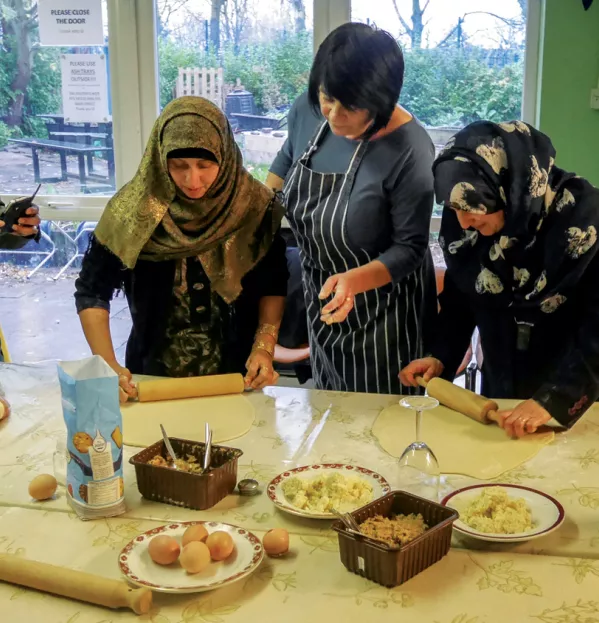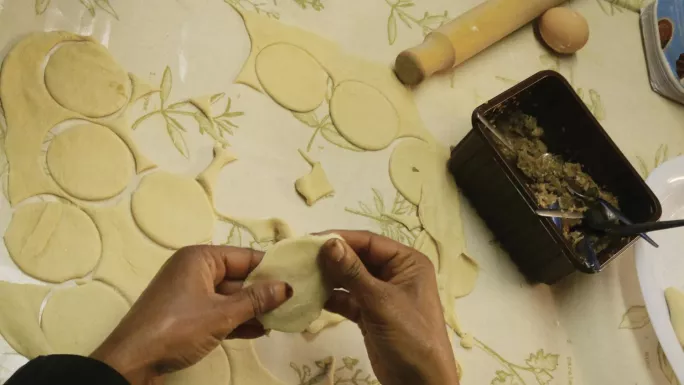Cooking up the perfect recipe for Esol classes

Tensions around migration may have been heightened by the inflammatory discourse surrounding the EU referendum and the US presidential election, but there is still a lot of compassion for the people arriving in the UK, with excellent projects supporting people’s transition to a new life.
One such initiative, Heart and Parcel, is based in Manchester. This community group invites women from migrant communities to meet, learn English and make dumplings.
The idea came about when Karolina Koscien and Clare Courtney - friends who worked together in a local restaurant - sat down to enjoy a bottle of wine and make Polish dumplings (pierogi). As they folded their dough and chatted, they realised that every culture or country had its own version of dumplings or wrapped food.
Koscien grew up in Poland and has a background in social work; Courtney, who teaches English for speakers of other languages (Esol), spent her childhood in Hong Kong before moving to mainland China and then the UK. With their combined experience (plus their love of food), they believed that creating an environment where women could learn English while cooking would help them to contribute to their community.
Each according to their knead
Having taught Esol in organisations that partnered with colleges, Courtney found the prescribed objectives and relentless targets to be restrictive for some learners. She also wanted to escape regulations dictating who could take part; Heart and Parcel’s only enrolment criteria are that participants are female and that English isn’t their first language.
Courtney felt that a relaxed environment for teaching Esol to whoever turned up would break down barriers to learning and create a nurturing family atmosphere.
“I thought, let’s have a session where we get all the women in and take all the pressure away,” Courtney says. “Let’s talk to the women and give them what they need instead of what we think that they need.”
When I joined in with a Heart and Parcel session, I was struck by just how warm the group was. The women in the class - who had moved to England from Iran, Iraq, Syria, Bangladesh, Pakistan and Afghanistan - had already formed a group bond, but were quick to welcome me.
After Courtney had taught the group the relevant vocabulary and Koscien had demonstrated how to make the dough, we kneaded it into shapes and compared the results.
The woman I sat next to was from Syria, and she told me about life in her homeland: mundane stories of family and routine. But then her life was turned upside down. President Bashar al-Assad’s crackdown on the Arab Spring uprisings and the rise of Islamic State made it impossible for her to remain in Syria. She and her family scattered to the countries that would accept them.
Life in the UK, she told me, meant that her children were finally safe, but she didn’t know if she would ever see her parents or siblings again. It soon became clear that the similarities within the group were profound.

A woman from Bangladesh was discussing a particular type of dessert with a woman from Iran. Our table then weighed in. Encountering some translation issues, everyone reached for their phones to scroll through images of the dishes they were trying to describe.
Soon it felt just like any other group of women cooking and eating together. They chatted about their kids with their mates, mucked around on Facebook and took selfies showing off the new dishes they had cooked.
Many of the women I spoke to attend formal Esol sessions as well as volunteer-led community groups. They are eager to learn. Some go to classes several times a week.
As a qualified teacher, Courtney is keen to stress the value in different types of community learning. “Unqualified volunteers are potential tutors,” she explains. “When given space to practise different teaching methods, volunteers have the opportunity to gain experiences within the field.”
But it’s not appropriate to rely completely on volunteers to deliver Esol, she adds: “It’s not fair in the long run.” (See box, below.)
Serving a purpose
Heart and Parcel generates its own funds through supper clubs and market stalls. It recently held its first kitchen takeover in a local restaurant, where volunteers cooked for 36 people. Courtney and Koscien run the ever-expanding group as unpaid volunteers alongside their day jobs.
This sleeves-rolled-up approach to community cohesion invites dialogue surrounding cultural acceptance and respect. Courtney laughs as she shares that some of the guests at the supper club had expressed surprise about their volunteer hosts. One said to her: “I didn’t think that women with headscarves would be so welcoming.” Rather than being offended, Courtney encourages open discussion: “It was great they said that because we’re often scared of talking about that sort of thing.”
We all make assumptions. I confess that I had assumed I would have little in common with the women in the class. As it turns out, I had a wonderful morning sharing a meal and learning from the women in the group - celebrating our cultural differences can highlight just how much we have in common.
Sarah Simons works in FE colleges in the East Midlands and tweets @MrsSarahSimons
You need a Tes subscription to read this article
Subscribe now to read this article and get other subscriber-only content:
- Unlimited access to all Tes magazine content
- Exclusive subscriber-only stories
- Award-winning email newsletters
Already a subscriber? Log in